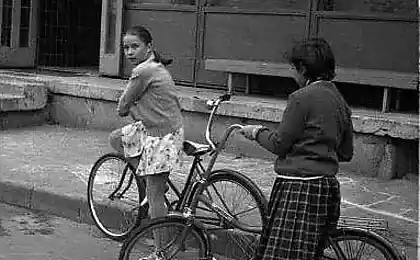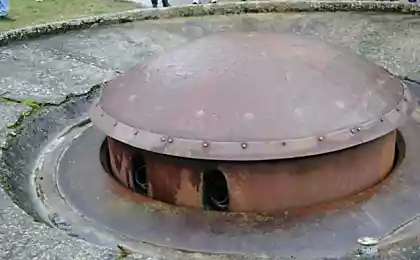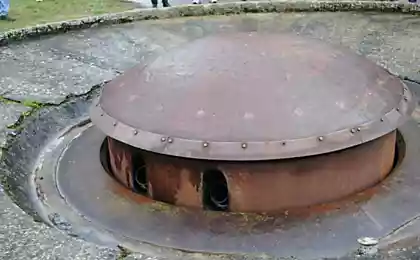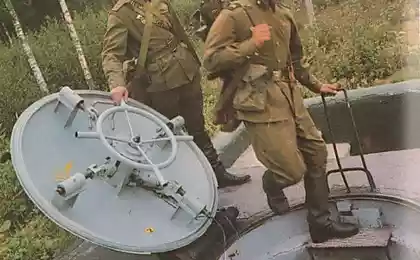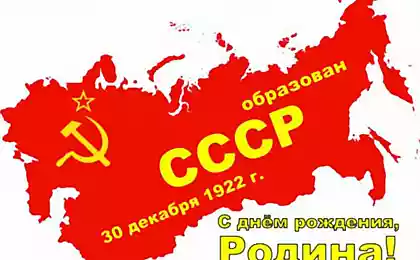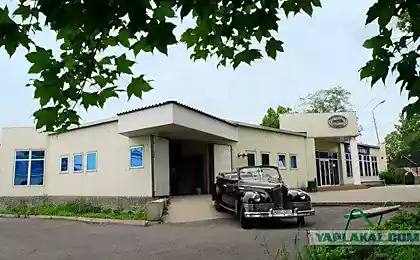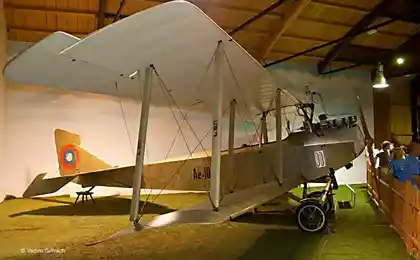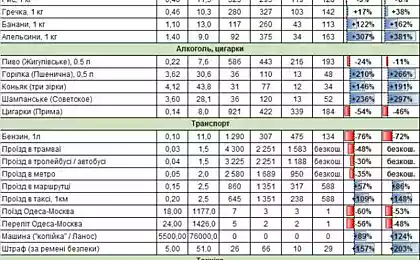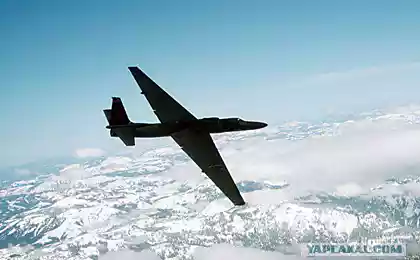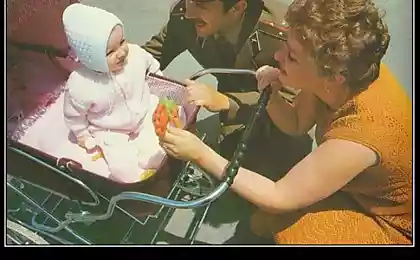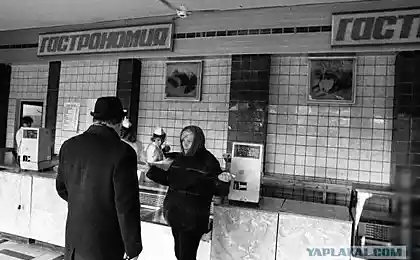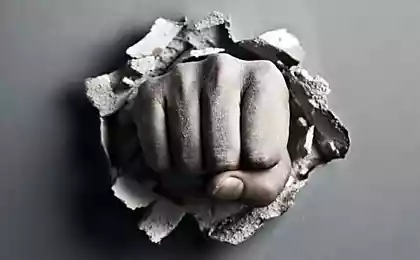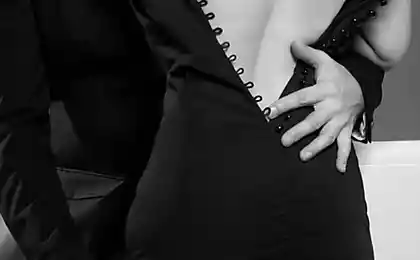1713
Prague-68: For your and our censorship
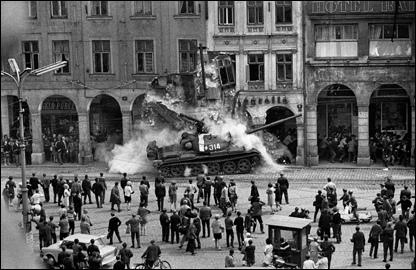
< 40 years ago by Warsaw Pact troops to assist the people of Czechoslovakia "fraternal assistance", which he did not ask. As is clear from the published documents today, the main reason for this step was the removal of a "brother country" censorship. Nothing else Prague reformers do not have time.
Gorbachev aide Anatoly Chernyaev, long worked in the international department of the Central Committee of the CPSU, resulting in his memoirs words Brezhnev said after a trip to Prague in December 1967:
"First Secretary Novotny complains presidium members, those strive to withdraw me aside are rooted first secretary. Why should I? Lacked in their internal squabbles to climb. Let them understand ».
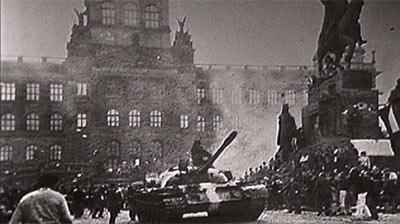
Prague 1968 from the archives of the BBC BBC
Nine months later, Brezhnev did not just "got" in the internal affairs of Czechoslovakia, and sent troops there. What happened?
"Democratization - a counterrevolution»
Reformist ideas of economic guru "Prague Spring" Deputy Prime Minister Ota Sik went no further than "market socialism", and full cost accounting, and they have not started to be implemented.
Caused by the summer talking about the possible legalization of the Social Democratic Party of Czechoslovakia and holding alternative elections and remained talking.
In contrast to Hungary in 1956, Czechoslovakia has never raised the issue of withdrawal from the Warsaw Pact.
One of the first acts of Alexander Dubcek, who headed the ruling Communist Party January 5, 1968, was the abolition of censorship and the designation of party bodies to inform the public about its activities. In the USSR, then it will be called "Glasnost».
In the spring of 1968 the Czechoslovak society is still faced with problems that entail any reform, no time to give up and split, and just enjoy the half-forgotten and desire freedom.
Moscow's reaction was immediate.
If we lose Czechoslovakia - I'll go with the post of general secretary
Leonid Brezhnev
Already in late February, the first secretary of the Communist Party of Ukraine Petro Shelest, accompanied Brezhnev to celebrate the 20th anniversary of the Czechoslovak Socialist Republic, wrote in his diary: "There are secretive force, taken possession of all the media, all sorts of clubs and societies».
At a meeting of the Politburo on 23 May to discuss the report where defense minister Grechko's visit to Czechoslovakia, Brezhnev concluded: "The liberalization and democratization - is, in fact, counter-revolution».
April 5th Plenum of the Central Committee of the Communist Party of Czechoslovakia adopted a "Programme of Action of the HRC", the text of which was included in the invented publicist Radovan Richt wording: "socialism with a human face". In Moscow, it is perceived as a challenge, and we have, in your opinion, what?
April 26, the secretariat of the Central Committee of the CPSU took the future "of perestroika" Yegor Yakovlev with a chief editor of "journalist." His fault was that he published in the professional edition of the text of the new Czechoslovak press law.
From 17 to 25 May in Carlsbad rested Soviet Premier Alexei Kosygin. At a meeting of the Politburo on May 27, he expressed his indignation: Ask him about the interview, local TV reporters asking tough questions, and then transferred to the recording aired uncut!
On June 27, the Czechoslovak newspapers appeared manifesto intellectuals "Two Thousand Words" prepared writer Ludvik Vaculik. The document does not contain anything special other than appeal to the leadership of the country to continue reforms and moral appeals to speak the truth.
However, judging by the further course of events, it was he the last straw of the Soviet leadership.
July 2 Grechko proposed "to create a strong group at the border and hold it in readiness».
The decision to "help the Czechoslovak people to restore order in the country" was taken at a meeting of the Politburo on July 5.
Even members of the CPSU Central Committee Meeting on 17 July plenum was not informed. Most of them learned about the invasion of the newspapers.
It is possible that the Soviet leaders were worried about the "order" not only in Czechoslovakia, but also at home. According to some historians and publicists, the thought of the possibility of an alternative socialism was unbearable to them than outright counterrevolution.
In Soviet samizdat then appeared the poem:
"I know that it will be better,
Because on the ground
Our walks, Soviet Dubcek,
Soon he will be in the Kremlin ».
Wait for the USSR Dubcek had another 17 years.
Whose hand?
"The whole course of action, it was felt, experienced hand guided the CIA and the intelligence agencies of Germany - wrote Shelest. - Unfortunately, our intelligence was poorly implemented ».
Meanwhile in Czechoslovakia openly acted KGB office with extensive staff and a large number of semi-official and secret "friends" at all levels of local government. Cooperation with Lubyanka not only attracted accusations of treason, but often the key to a successful career. Western intelligence could not even dream about such opportunities.
According to reports, on the eve of the invasion of Soviet spies and their colleagues from the Warsaw Pact countries are actively engaged in a "special operation" to justify future military actions.
In May, the newspaper "Berliner Zeitung" appeared sensational information: Prague saw eight US tanks!
The decision to send troops will be implemented, even if it would lead to World War III
Marshal Andrei Grechko
It turned out the historical film was shot, no tanks were not, and there was a crowd of extras in the American military uniform.
In mid-July on anonymous letters near the western border police found five boxes with American rifles during World War II.
Soviet newspapers wrote: US is already supplying weapons counterrevolutionaries.
However, officers of the Czechoslovak Ministry of Internal Affairs found that machines were previously stored in the warehouse of the Group of Soviet Forces in East Germany.
The same confusion occurred with the message found in the recesses of radio stations, allegedly secretly brought from Germany. It turned out that caches long ago laid the Czechoslovak state security in the event of war.
When the country began collecting signatures demanding the police to disperse, Interior Minister Jozsef Paul found out that doing it the Czechoslovak secret police on the orders of his own deputy Viliam Shalgovicha known ties with the KGB.
Soviet agents posing as Western tourists, pasted in Prague inflammatory leaflets.
"Pravda" published "plan ideological subversion against Czechoslovakia", allegedly developed by the CIA. After 1991, it became clear that the document prepared service "A" of the KGB.
Codename unit represents the first letter of the phrase "active measures". So in the jargon activities were called disinformation.
Even at the cost of World War
At 9 am on August 18 in the hall on the second floor of the building of the Ministry of Defense, where he assembled a top generals, Marshal Andrei Grechko appeared.
On the meeting, said in his book "The Invasion. Czechoslovakia. 1968 "General Alexander Mayorov - former commander of the 38th Combined Arms Army, one of the three who were to carry out the occupation.
Forbidding presence makes any records, Grechko declared: "I have just returned from a meeting of the Politburo. Decided to enter the Warsaw Pact troops in Czechoslovakia. This decision will be made, even if it would lead to a third world war ».
Are you really do not know who you are dealing?
Janos Kadar in conversation with Alexander Dubcek
Indeed, not only discussed the Czechoslovak operation, but also the readiness of the armed forces of a nuclear conflict.
Commander of the Airborne Forces Vasily Margelov reported: "Comrade Minister, all seven divisions [Airborne], ready to smash to pieces any enemy!».
"Quietly, General" - cool it Grechko.
After the invasion of the semi-lectures on the international situation by representatives of Party committees "Trustee" informs the audience that the Soviet troops ostensibly on a few days ahead of the Americans and West Germans, have already made the jump to Czechoslovakia.
It's hard to say how the Soviet authorities were engaged in propaganda, and how are themselves in thrall anti-Western paranoia.
Viktor Suvorov, 1968 is not yet the author of "Icebreaker" and not even GRU officer, and the commander of a tank platoon in the Carpathian Military District, in the book "The Liberator" reports that Soviet commanders before the operation set the task to be ready for a meeting with NATO tanks , not to open fire, but try to move as far as possible, since it is possible that have to share Czechoslovakia to "western" and "eastern».
Meanwhile, according to the memoirs of the Soviet ambassador in Washington, Anatoly Dobrynin, who on August 21 asked Lyndon Johnson to urgently adopt it, the US president in the first minute, it seems painfully remembered what this country - Czechoslovakia, and where.
Limited sovereignty
In the spring of 1968, the Soviet ambassador in Prague Stepan Chervonenko the Politburo reported inevitable political costs in case of power solutions.
During the break, says Chervonenko, Brezhnev sat down beside him and confidentially said: "If we lose Czechoslovakia, I'll go with the post of General Secretary!».
Former party worker who became a diplomat, was not surprised that the Secretary General spoke of the sovereign state as the Soviet property.
At a meeting with members of the Czechoslovak leadership in Moscow, held after the invasion, Brezhnev had to argue their position.
"In domestic policy, you do what you please, without paying attention to the fact, whether we like it or not - he said. - Czechoslovakia is within those territories during the war liberated Soviet soldiers. The boundaries of these areas - our border. And always will ».
When the West was named this concept "doctrine of limited sovereignty" in Moscow rebelled and called the term anti-Soviet slander.
"Class brothers»
Leaders of other countries of the Warsaw Pact could not be the main culprits of the occupation of the neighboring country, but become active partners.
Founded fear of Czechoslovak example they had more than the leaders of the USSR.
Alexander Dubcek (photo Horst Maierhofer)
Alexander Dubcek did not fit the image of a communist functionary
Particular diligence shown Wladyslaw Gomulka and Walter Ulbricht.
Gomulka at a meeting on July 13 almost shouted at Brezhnev, accusing him of inaction.
In order not to evoke memories of the German occupation of Czechoslovakia, the Soviet leadership until the last moment did not want to involve the army in the operation of the GDR, but Ulbricht insisted: "We are also included in the Warsaw Pact!».
Only Janos Kadar, behind which was the experience of Budapest in 1956, he tried to warn Friendly Dubcek.
Four days before the invasion, he asked for an urgent meeting and warned that if Dubcek immediately starts to himself, "to restore order", the occupation is imminent.
Czechoslovak leaders did not believe. Then, as recalled Dubcek, Kadar "with hints of desperation in his voice," said, "You really do not know who you are dealing?».
news.bbc.co.uk/hi/russian/international/newsid_7557000/7557036.stm

